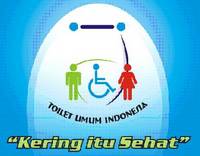How inconvenient
I did set my alarm and get up at 3am, made a mug of coffee and plonked myself down in front of the telly ready to watch Charlton win their 3rd game on the trot, or preferably a stroll. And what did TV7 decide to show? A recording of Manchester United beating Crystal Palace from Sunday, that's what.
Bloody typical. So it wasn't until the morning, having tried to recapture my dreams, that I discovered that it had been a cracking match against Fulham,
deservedly won 2-1.
Still, I wasn't going to waste my day. Was I?
Up at 8, don't be late, and off to the public launch of the
National Movement for the Socialisation of Standard Public Toilets in Indonesia held in the plush surroundings of Hotel Aston.

Having signed in and got my bag of goodies, it was a tad disappointing to see so many empty chairs as obviously a lot of effort had gone into preparing everything. I wasn't too enamoured either to have to sit through nigh on 40 minutes of a sales spiel from Domestos, whose free samples I was clutching. My impression was that all attendees were of the social class which enjoyed toilets which are clean and hygienic.
That there is a paucity of public toilets is something
I've commented on previously. I was pleased to find others with the same concern. They range from those with vested interests, such as Domestos, Toto, the
World's Largest Toilet Manufacturer rather than
the rock group - which came first? - and Mowilex, a
Ciputra Group company apparently, who make paint, sealants and stuff, to the only government department with the brief to construct public toilets, the Ministry of Tourism, and one gentleman from the city government's Department of Health who scarpered very quickly when he realised that I may have had something unpleasant to say.
I then had a lengthy chat with some of the principals involved in this campaign, namely Naning Adiwoso, the co-ordinator, and Enny Herawati, the promoter. I asked about the involvement of a multi-national such as Unilever, which professes to have
a concern for the environment whilst some environmentalists think
the company is evil because of the pollution caused by the chemicals used in the manufacture of its products.
As always, the answer is simple. They provide funding which enables a higher profile ~ and this was certainly a very professional launch. Naning mentioned that visitors to Borobudur will soon be able to benefit from model toilets, built with the design expertise of the
Indonesian Institute of Architects.
There wasn't time to discuss the use of dry toilets, although Naning agreed that this is a technology worthy of further investigation, especially as the slogan for this campaign is
Kering Itu Sehat (Dry is Healthy).
I counted four journalists covering the event so I look forward with interest to reading tomorrow's papers, though I won't hold my breath. As with all community-based initiatives, it is the sum of all our efforts which prove the most successful.
An invitation is extended to all who wish to contribute thoughts and information regarding the whereabouts of any public toilets in Jakarta to contact us at
Jalan-Jalan Jakarta, the H.Q. of Jakarta's Good Loo Guide.
All in all, it hasn't been too shitty a day.
|
